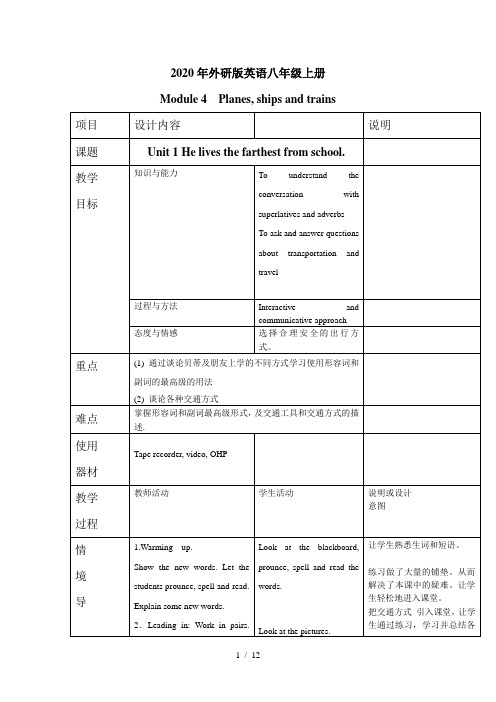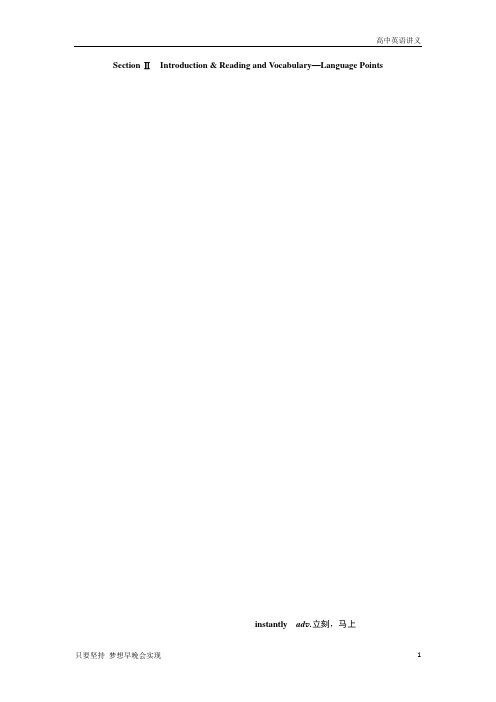外研高中选修八 Module 4 教案 2
2020年外研版英语八年级上册Module-4单元教案

2020年外研版英语八年级上册Module 4 Planes, ships and trains教学课题:Module 4 Planes, ships and trainsUnit 2 What is the best way to travel?项目设计内容备注课时第 1 课时课型阅读课教具Tape recorder,OHP教学目标知识与能力To understand the passage on travel and transportation。
Tobe able to understand specific information in a textKey vocabulary: jouney, park, outside, however, costKey structures:The more information, the better.And it takes you about twelve hours to get there. It is thefastest and the second cheapest…过程与方法Interactive and communicative approach态度与情感通过学习,使学生能够比较各种交通方式,流利地和他人交流。
重点 1.本单元单词和短语。
2.形容词和副词的比较级及最高级的用法。
难点理解形容词和副词的比较级及最高级的用法。
教学手段方法Communicative教学过程教师活动学生活动说明或设计意图1.Warming up.Revision:How do yougo to school?2.Learn some new words.Look at the blackboard,Answer the questions.Look and say. Look at the blackboard,prounce, and spell read the words.让学生熟悉生词和短语。
外研版八年级下册(新)Module4Unit2研究课教案

4. get a clear idea of how to get a good result of doing exercise.
教学环节 Step1. Lead-in
Step 2 Pre-reading
Step 3 While-reading
Step 4 Post-reading
Step 5
教学过程
教学活动
设计意图
Present a picture, introduce the proverb and introduce the topic of the class.
Do a quiz on the types of exercise
1. find the information about the reason, the way and the result of four people’s doing exercise;
2. analyze and summarize the reason for the success or failure of the four people’s doing exercise;
课型 阅读课
课题名称 Module 4 Unit 2
授课教师
授课班级 初二
教材分析
第 4 模块的主题为健康生活,而第 2 单元主要侧重于通过体育锻炼达到健康生活 的目的。课文内容由 4 个小文段构成,分别介绍了 Anna, Wang Wei, Thomas 和 Richard 4 人不同的锻炼方式。Anna 通过遛狗锻炼身体,Wang Wei 通过踢球锻炼身体,Thomas 骑车上班锻炼身体,Richard 病后跑步锻炼。每一段按照顺序讲述主人公从事某项运动 的原因、过程和结果。
外研高中选修八 Module 4 教案 1

1.variety变化;多样性;种种;各类
The shopping-centre sells a variety of goods.
这个购物中心出售许多种商品。
When the news of a free variety show at our local cinema got round, we all rushed to see it.
当鸟食公司要在我们当地电影院演杂技的消息传出时,我们都赶紧跑去观看。
At school we learn a variety of things.
在学校我们学习各种东西。
(与of连用)变种
new varieties of wheat
小麦的新品种
He didn't come for a variety of reasons.
警察有充足的事实对付那个囚犯。
Is that the case? No, that's not the case.
事实是那样吗?不,事实并非如此。
in case以防;可能;倘若
Take a hat with you in case the sun is very hot.
倘若太阳很利害,你就把帽子戴上。
I have an important matter to talk to you about.
我有件重要的事要和你谈谈。
It doesn't matter if you are late.
你如果迟到也没关系。
But this does not matter, for, as he has often remarked, one is never too old to learn.
外研版英语八下_Module 4 Unit 2 第二课时教案

八年级英语教学设计课题Module 4 Seeing the doctor课型写作课序号Unit 2 We have played football for a year now.课标分析学习内容分析学情分析现实问题闭环式学习任务设计随着快速的生活节奏,我们的学生健康问题日益突出,学生需要能辨别健康与不健康的生活方式,能关心自己和他人健康,并给出合理的建议,制定适合的运动计划。
解决问题解决方案英语问题提出问题任务驱动合作交流展示完善抽象概括推广迁移应用了解健康生活方式,讨论哪些适用于中学生,并总结运用.读图猜测,Colin 遇到了哪些健康问题,你会给出什么建议,最后Colin 怎样了?Do a survey about how to keep healthy with your classmates and think about if they have good healthy living ways.学习目标(学习活动+学习主体+(行为程度)+评价活动)free talk 及work in groups. 90%的学生能运用上节课所学的现在完成时进行复述,其他10%在同伴帮助下复述。
通过跟读、自读、查读,85%的学生能准确流利朗读课文。
其他15%同学能读熟、读准文章中的重点短语和句型。
通过分析句子、小组合作,学习重要知识点的用法,95%学生能说出非延续性动词与延续动词转换、目标词汇及句型的意义和用法,并进行变式练习翻译句子。
其他同学能复述出他人总结的句子。
通过组内交流、运用所学目标词汇,80%同学能运用所给提示词描述不健康方式产生的原因,给出建议,采用的健康生活方式,以及健康生活方式之后的改变。
学生勤锻炼,养成健康的作息规律和生活习惯。
重点:运用生活习惯,生活方式的词汇、及句型写作文突破措施:先口头造句练习-----同伴互帮互评-----教师批改----两批三改 难点:非延续性动词与延续动词转换突破措施:自主总结归纳、分类理解记忆、小组互查题型设计层层递进、教师精讲点拨、二次巩固过关教学技术学具准备:课本、笔记本、笔教具准备:电脑、PPT、黑板、粉笔教学实施环节学习内容学生活动评价活动问题预设与补救措施1.融入情境,以旧促新(回扣目标1)根据图片复述课文内容教学内容:回顾文章的内容及结构。
外研八上M4U2 What is the best way to教案

Module 4 Planes, ships and trainsUnit 2 What is the best way to travel?教学目标【知识目标】能够正确使用以下单词:journey, book, outside, choice, however, cost【能力目标】1. 能够读懂有关旅游和交通工具的文章,并抓住文章细节。
2. 能够运用形容词、副词的最高级形式对几种交通方式进行比照。
【情感态度目标】了解英语国家有关旅游和交通等方面的信息,并密切联系自己的日常生活,从而拓展视野、激发学习英语的兴趣。
教学重难点【教学重点】能够理解有关旅游和交通工具的文章。
【教学难点】能够正确运用形容词、副词的比拟级和最高级,写一篇旅游日志,比拟各种交通工具的便捷和不便之处。
教学过程Step 1 Warming-upLearn some new words.Step 2 Work in pairs.1. Talk about places you go to and how you get there.How do you get there?What’s the cheapest way to get there?What’s the best way to get there?2. Show some pictures.3. Talk something about the pictures.Step 3 Reading.1. Play the recording and listen to the tape carefully.2. Ask the students to read through the passage.3. Read the passage by themselves.4. Read the text together.5. Read the passage and number the ways of travelling from the most expensive to the least expensive in Activity 2.6. Check with a partner.7. Call back the answers from the whole class.Step 4 Complete the table.1. Read the passage again.2. Complete the table.4. Call back the answers from the whole class.Keys;1. the most comfortable the most expensive.2. the cheapest, crowded and it takes so long.3. the fastest and the second cheapest wait for hours at the airport because of bad weather.Step 5 Complete the passage.3. Complete the passage with the correct form of the words from the box.4. Check with a partner.5. Call back the answers from the whole class.Keys: 1. choice 2. journey 3. However 4. cost 5. outsideStep 6 Work in pairs.Ask and answer about the ways of travelling. Use the information in the table. —What’s the cheapest way to travel from London to Paris?Write a passage about ways of travelling from London to Paris. Use the information in Activity 5 and the passage in Activity 2 to help you.You can go from London to Paris by coach, plane or train. Travelling by plane is the fastest but also the most expensive.Step 8 Important and difficult points1. journey, travel和trip的用法辨析2. cost 的用法3. The more information, the better. 信息越多越好。
外研版选修八:Module 4 Which English Section Ⅱ

Section ⅡIntroduction & Reading and Vocabulary—Language Pointsinstantly ad v.立刻,马上conj.一……就…… (=as soon as)(教材P44)The quality of someone’s voice and their choice of words make a person instantly recognisable, even though you can’t see him or her.一个人的音质及措辞都能让这个人立即被辨认出来,即使你看不见他/她。
instant n.瞬间,刹那adj. 立刻的,立即的the instant 一……就……in an instant 立刻;马上①He sent me an email instantly he arrived in Paris.他一到巴黎就给我发了一封电子邮件。
②I asked him a question about how to learn English and he replied instantly.我一问他如何学英语,他马上就给我答复了。
[即学即练]——单句语法填空①(广东卷)This site gives you instant (instantly) access to a wide range of information on studying and living in the UK.②Much to my surprise, she burst into tears the instant she read the letter written by her mother. [链接写作]——句式升级(普通表达)As soon as he arrived at the theatre, he found the ticket a friend gave him left at home.③(高级表达)On arriving at the theatre, he found the ticket a friend gave him left at home.(on doing)④(高级表达)The moment/instant/minute/Instantly/Immediately/Directly he arrived at the theatre, he found the ticket a friend gave him left at home.⑤(高级表达)Hardly/No sooner had he arrived at the theatre when/than he found the ticket a friend gave him left at home. (hardly...when.../no sooner...than...)instantly既可作副词,也可作连词,有类似用法的词还有immediately, directly等。
外研高中选修八 Module 4 教案 3

Where do the two roads join?
这两条马路在哪儿会合?
join combine unite connect
都含“联合”、“结合”、“接合”的意思。
join指“任何事物的直接连接,连接的程度可紧可松,还能分开”之意,如:
The new highway has joined the two cities.
两个主要政党已经联合起来组成政府。
connect
Will you connect this wire to the television.
你把这根电线和电视机连上好吗?
"If it is built, it will connectBritaintoEuropefor the first time in history."
Main language points in the text.
bine
The two small shops combined to make a large one.
这两个小店合并起来成为一个大商店。
The two principal political parties have combined to form a government.
新公路把那两个城市连接起来。
combine着重指“两个或两个以上的人或事物为了共同目的而结合在一起,结合后原来部分可能仍不改变或失去其本性”,如:
combine milk and water
把水和牛奶混在一起。
unite强调“紧密地结成一体”,含“极难分开”之意,如:
be united as one
她认真学习而精通英语。
Some people go back for their education to acquire another degree or diploma to impress the society.
外研版高中英语选修8Module4教案WhichEnglish

Module 4 Which English?教学设计说明话题介绍本模块主题为不同国家间英语的差异,并引入了与此有关的词汇。
要求学生了解上述内容并掌握有关的词汇,培养有关的语言技能。
Period 1 Reading and Vocabulary (1) INTRODUCTION Vocabulary and reading 和READING AND VOCABULARY合并为第一课时“阅读课”。
课文“Which English?”属说明文体,介绍了英国、澳大利亚、牙买加和新加坡四个说英语的国家。
在学生课前自学、预习的基础上,以背景介绍导入新课,然后采取“自上而下”的阅读教学模式,引导学生关注文章的篇章结构、段落大意,得出“树型图”,进行“信息转换”,理解全文、复述意义。
教师还可以参考“教学资源”The Analysis of the Difficult Sentences from Module 4 Which English?中的材料,帮助学生解决字、词、句等方面的问题。
Period2 Reading and Vocabulary (2) Reading and Vocabulary “The Future of English”为阅读课,介绍了当今英语对世界的影响和发展趋势,配有三个相关活动。
通过快速阅读了解文章大意,再精读回答相关问题,充分理解文章结构及重点词、句。
Period3 Reading Practice Reading Practice “Colourful E nglish” 也是阅读课。
阅读内容为英语中的成语和谚语等。
分为七个活动,围绕课文展开。
Activity1为读前活动;Activities2-4 帮助学生抓文章的主旨;Activity5为细节理解;Activities6-7以文章内容为基础,组织学生开展说和写。
Period4 Cultural Corner 课本55页“文化阅读课/CULTURE CORNER”的主题为Chinese as a Foreign Language“汉语作为一门外语”。
- 1、下载文档前请自行甄别文档内容的完整性,平台不提供额外的编辑、内容补充、找答案等附加服务。
- 2、"仅部分预览"的文档,不可在线预览部分如存在完整性等问题,可反馈申请退款(可完整预览的文档不适用该条件!)。
- 3、如文档侵犯您的权益,请联系客服反馈,我们会尽快为您处理(人工客服工作时间:9:00-18:30)。
2. Ask the student to read the text and finish Activities 2, 7 and 3.
3. Discuss the exercises in Activities 5, 6.
2.matter, affair, thing, concern, business
matter所表示的“事情”在含意上比较模糊,通常指客观存在的或有待处理的问题
Education in the wilderness is not a matter of monetary means.
荒凉地区的教育不是钱财问题。
even if even though
这两个词组大致意思相当,但从强调的侧重上来看还是有所不同的。
even if: used for emphasizing that although something may happen or may be true, another situation remains the same
我要当个律师。
He aimed to swim a mile.
他的目标是游一英里。
The factory must aim at developing new models of machines.
该工厂必须致力于研制新型机械。
What is your aim in life?
你生活的目的是什么?
His aim was to swim a mile.
e.g. Most of us ignore this good advice, even though we know it to be true.
e.g. Even though I have a master's degree in business administration, I can't fill out my tax form.
2.even though (= even if)和though都为连词,前者为“即使,纵使”,表示退一步设想,引导一个条件状语从句,含有不肯定的意味;后者为“虽然”,引导一个让步状语从句,表示的是一种事实。参见下列两个例句,前一句表示一种设想与假设,后一句表示“他确实知道”的事实。
2.matter, affair, thing, concern, business
1.Ask the students to read the new words by t a dictation on the new words and expressions in the module.
Activities:
affair以单数形式出现时,通常指一般的“事情”,而以复数形式出现时,通常指重大的“事情”。不管单、复数这个词所表示的“事情”都包含着“在进行中”、“处在过程中”或“交易、交往”的意思。
Having found out that his wife had an affair with another man, the poor man wanted to kill himself.
4. Pair work: Master the main words in Activities . Then find out the example sentences in the text.
Main language points:
1.even if = even though:in spite of the fact; no matter whether即使;尽管。
她感到怒火从心头燃起。
4.aim
He aimed with the gun.
他用枪瞄准。
She aimed a pistol at the bandit point-blank.
她用手枪直接瞄准强盗。
He aimed the gun at the enemy officer.
他用枪瞄准了敌军官。
I aim to be a lawyer.
在这些旧城墙里面曾经有一座城市。
Success is within our grasp now.
现在成功已经在望。
Please stay within hearing.
请不要跑到叫得应的距离以外去。
He lives within 20 minutes'walk.
他住的地方走20分钟就到。
Do what's within your power!
even if even though
这两个词组大致意思相当,但从强调的侧重上来看还是有所不同的。
even if: used for emphasizing that although something may happen or may be true, another situation remains the same
even, even though, though
这一组词十分容易混淆。
1.even是副词,作“甚至”解,用来强调语气。它在句中的位置应靠近所强调的词或短语,否则会引起歧义。体会以下各句意思:
She would not even enter my room.她甚至不进我的房间。
Even she would not enter my room.甚至连她也不进我的房间。
matter所表示的“事情”在含意上比较模糊,通常指客观存在的或有待处理的问题
Education in the wilderness is not a matter of monetary means.
那个可怜的男人由于发现他的妻子与另一个男子有私情而想自杀。
Convenience is, however, in all affairs of life, an execrable test of value.
然而,在生活的一切事务中投合是可恶的实用准则。
thing在含义上比matter还要模糊,有时为了含糊其词而有意用thing。如:I hope things'll be better in the future.
She would not enter even my room.她甚至连我的房间也不进来。
2.even though (= even if)和though都为连词,前者为“即使,纵使”,表示退一步设想,引导一个条件状语从句,含有不肯定的意味;后者为“虽然”,引导一个让步状语从句,表示的是一种事实。参见下列两个例句,前一句表示一种设想与假设,后一句表示“他确实知道”的事实。
尽力而为!
He succeeded in keeping his temper within bounds.
他忍住了怒火。
The child came within an ace of being drowned.
孩子差一点儿淹死了。
She felt the anger mounting up within her.
教案:教案序号:年月日
课题
Module4
Which English
Vocabulary and Reading (1)
课型
New Lesson
教学
目标
1. Finish the Exercises in the textbook.
2. Understand the text.
3. Master the main language points in the text.
We live within earstot of the factory whistle.
我们住的地方听得见工厂汽笛声。
He learned to speak English within six months!
他在六个月之内学会了说英语。
Within these old walls there was once a town.
Even if we have learned “even though”, we still find it difficult to use.尽管我们学过“even though”,但我们还是发现运用它很难。
He likes to help us even though he is very busy.尽管他很忙,他还是愿意帮我们。
重点
Understanding of the text.
难点
Main usages of some words in the text.
基本
设想
Reading, Practising and Explaining
教学
过程
教学内容
教法
学法
Step 1
Step 2
Step 3
Step4
Revison
Review the new words and expressions in the module :
even though: used for introducing a fact that makes the main statement in your sentence very surprising
even, even though, though
这一组词十分容易混淆。
1.even是副词,作“甚至”解,用来强调语气。它在句中的位置应靠近所强调的词或短语,否则会引起歧义。体会以下各句意思:
He will not tell us the secret, even though/even if he knows it.即使他知道这个秘密,他也不肯说出来。
He will not tell us the secret though he knows it.虽然他知道这个秘密,但却不肯说出来。
